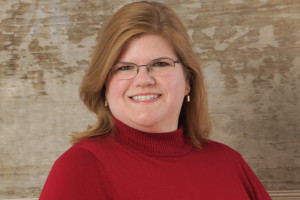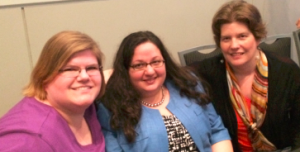Ask a Special Librarian – May Edition (Part 1 of 2)
Tracy Z. Maleeff
Library Resources Manager at Duane Morris LLP in Philadelphia
@LibrarySherpa & LibrarySherpa.com
 Mentoring. It’s a word that seems to strike fear in the hearts of new and experienced professionals alike. If you are just starting out, you probably often hear a refrain of, “Get a mentor!” constantly. But, then you panic and wonder how one goes about doing that. Conversely, if you have been in the library/information profession for a while, you may think that you do not have time to be a mentor. Or, worse, you have a crippling case of “imposter syndrome” where you convince yourself that you have nothing of value to share. By sharing my own story as a mentor, and with help from my own mentee, we hope to show you the benefits of a mentor-mentee relationship for your career and professional development.
Mentoring. It’s a word that seems to strike fear in the hearts of new and experienced professionals alike. If you are just starting out, you probably often hear a refrain of, “Get a mentor!” constantly. But, then you panic and wonder how one goes about doing that. Conversely, if you have been in the library/information profession for a while, you may think that you do not have time to be a mentor. Or, worse, you have a crippling case of “imposter syndrome” where you convince yourself that you have nothing of value to share. By sharing my own story as a mentor, and with help from my own mentee, we hope to show you the benefits of a mentor-mentee relationship for your career and professional development.
My story as a mentor:
I had just finished my “State of the Division” address to SLA’s Legal Division in my role as Chair at the 2012 Annual Conference & INFO-EXPO in Chicago. A new professional I didn’t know approached to tell me how much she enjoyed my speech and how invigorated she was to get involved with the division. I exchanged business cards with her, then, followed up after the conference. As she got involved with the Legal Division, I got to know more about her and her work product. Over time, I realized that I saw a lot of my younger self in her and decided that I wanted to formalize our professional relationship as mentor-mentee. In advance of the SLA annual conference in 2014, I basically half-asked, half-told her that I was going to be her mentor now. The reason I was so bold with only “half-asking” is that I knew that my mentee would be too considerate and tell me that I was way too busy to mentor her. She may have had a point; but I wasn’t taking no for an answer. (To establish your own mentor-mentee relationship, feel out each other’s personalities before making any bold moves.)
I made sure my mentee knew I would always available for her and would be just a phone call or email away. We now have a standing schedule of a one-hour phone call on a quarterly basis. I give my mentee assignments that we go over during each call. For example, when we met in person at the SLA 2014 conference in Vancouver, I gave her three tasks to complete before our next phone call. I asked her to update her resume and send it to me, create a Twitter account for professional Tweeting and to read the book, “Who Moved My Cheese? An Amazing Way to Deal with Change in Your Work and in Your Life.” Having tasks and regularly scheduled calls/meetings helps to provide structure to ensure that the mentee gets something valuable out of the relationship. I have found that it also helps me as the mentor to be focused so that one-hour phone call is productive. Being a mentor is very rewarding and helps me to build my own professional development skills in the process. Mentoring helps you hone your listening, management and critical thinking skills. It has been a fulfilling journey thus far, and I am looking forward to the future of this professional relationship.
I asked my mentee to share her thoughts about mentoring. She makes an excellent case for having more than one mentor and shares how that has helped her professionally.
My mentee’s story – Christine DeLuca (@cdelucac):
Mentoring has helped me develop in ways I never imagined. I am lucky in that I have found two amazing professionals to help me in my journey. My first exposure to a true mentor is my boss, Jane Freeman. She coached me through a lot of my challenges as a new professional and continues to be a pillar of understanding and strength for me. What makes our relationship so valuable and special is that we are able to make it a reciprocal relationship. For example, Jane has given me a strong research foundation, and provided me with ways of strengthening my soft skills and building confidence. I have helped her reevaluate my firm’s student legal research program, taught her some advanced computer skills and reminded her how rewarding volunteering with professional associations and the local library school can be.
For the past year, I have also had the amazing opportunity of being mentored by Tracy. She has added value to my life by helping me figure out what my professional weaknesses are and how to conquer them. For example, while I love leading training sessions with the lawyers and students at my firm, I find it very difficult to get up in a room of other librarians and make a presentation. Tracy is helping me build my confidence. She has taught me that it is okay to be scared, but it is not something that you should let stand in the way of your professional development. I also value her outsider perspective about workplace challenges and professional growth, and how she is always my number one cheerleader when I doubt an important decision. She also gives me a kick in the pants when I really need it!
While I would consider both relationships to be more formal, mentoring comes in all shapes and sizes. If you are having difficulty finding a mentor, think about the people in your life who you seek advice from and who take a professional interest in you. You might not even realize it, but they are your mentors. Formal acknowledgement of mentoring relationships is not always necessary. Peer mentoring might also be appealing for those who need a way of getting their feet wet. Starting a group of people with similar years of service who have different workplace experiences will help you reexamine the way you look at challenges at work while providing you with a strong network of people to lean on. In short, there is no right or wrong way to find those people who help you become the best you. Just do it!
In Summary:
If you are a new professional, don’t be afraid to speak up and connect with an established professional. Be open to having a mentor, or two! If you are more of an intermediate or advanced professional, know that you do have something of value to share. Just your own experiences contain life lessons for someone who is new to our profession. It doesn’t take as much time as you think to have a meaningful connection with a student or new professional. Make the time now so that you can help others and yourself. For both parties involved, come to mutually-agreed upon terms of how your professional relationship will be. How often will you meet or talk? What is expected out of each party? Do you have an end goal or end date? A mentor-mentee relationship is just another cog in the wheel of professional development that helps us all make our profession stronger.
Shameless Plug:
Both Christine and I will be speaking at the SLA 2015 Annual Conference & INFO-EXPO in Boston next month. I will be presenting a Quick Take session entitled, “Legal Resources and Research Using Twitter” on Sunday, June 14th at 1:30 p.m. I will also be co-presenting a contributed paper with my co-author, Leslie Hicks, on Tuesday, June 16th at 2:00 p.m., “Network Like Nobody’s Watching: Demystifying Networking as a Skill for Librarians and Info Pros.” Christine will be a panelist for the session, “Get Out of Your Chair and Revolutionize Your Training Program!” on Monday, June 15th at 4:00 p.m. Hope to see you in Boston at SLA 2015!
(L to R) Tracy Z. Maleeff (mentor), Christine DeLuca (mentee) and SLA 2014 President Kate Arnold
We were a part of a panel discussion, “SLA Hot Topic: Industry Research in Action: Enhancing the Value of Information Services” at the SLA 2014 Annual Conference & INFO-EXPO in Vancouver, BC, Canada.
